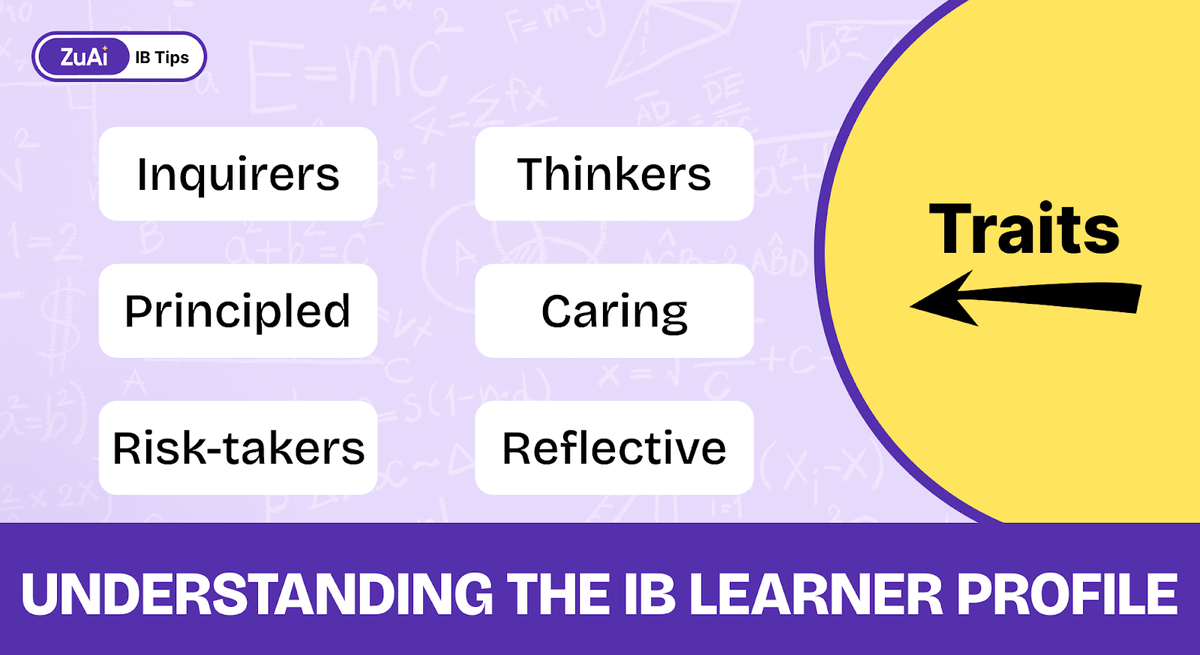Understanding the IB Learner Profile

How can IB students navigate a program that demands not only academic excellence but also personal growth? The International Baccalaureate (IB) learner profile, with its ten core attributes, aims to answer this challenge by shaping students into well-rounded, globally aware individuals. Each attribute—from being an inquirer to a risk-taker—is designed to foster essential skills like critical thinking, empathy, and resilience. A study from the IB Organization reports that 80% of IB graduates feel these traits helped them succeed beyond high school, highlighting the program’s impact on long-term development.
For IB students, understanding and embracing these attributes is crucial to thriving within the program and beyond. The IB learner profile goes beyond test scores, focusing on character-building and lifelong learning—a framework that helps students navigate both academic and personal challenges.
Let’s explore how to master each attribute of the IB learner profile. Dive into the blog to unlock strategies for academic and personal growth.
Also read: Understanding Internal and External Assessments in IB: Key Differences and Strategies for N24/M25
What Are the IB Learner Profiles?
The IB learner profiles represent an aspirational vision, a set of values and attitudes that help students grow into responsible, thoughtful citizens. They serve as guiding principles that shape the IB curriculum and are woven into all levels of the program. By embodying these characteristics, IB students not only prepare for academic success but also nurture qualities essential for life beyond school.
Why the IB Learner Profiles Matter?
Each learner profile trait equips students with unique skills essential for success in our interconnected world. For instance, by developing traits such as Open-mindedness and Communication, students gain cultural sensitivity and the ability to engage with diverse perspectives. This not only aids personal growth but also prepares them for the multicultural workplaces and communities they will be a part of.
Traits of the IB Learner Profile
Here’s a quick overview table of the Traits of the IB Learner Profile:
Let’s take a closer look at the ten IB learner profile traits and understand how each contributes to holistic student development:
Inquirers
Inquiring minds foster a deep love for learning, characterized by natural curiosity and a drive for independent research. IB students are encouraged to ask questions, explore new ideas, and seek answers through hands-on research. This inquisitive mindset prepares them for university-level academics and beyond, cultivating lifelong learners ready to tackle complex problems.
Knowledgeable
The knowledgeable trait is about building a solid understanding of significant concepts across multiple subjects. IB students explore topics that span global and local issues, creating a well-rounded foundation of knowledge that allows them to connect ideas across different fields.
By becoming knowledgeable, IB students gain confidence and insight into diverse topics, enabling them to make informed decisions and contributions. This quality is a direct asset in a world that values critical thinkers.
Thinkers
Thinkers embody the ability to apply critical and creative thinking skills to complex challenges. In the IB program, students develop these skills through problem-solving activities that encourage them to assess situations from different angles.
Thinking critically is essential not only in academics but also in daily life, allowing students to analyze information, evaluate perspectives, and form reasoned conclusions. ZuAI’s AI buddies assist students in enhancing their critical thinking abilities by guiding them through problem-solving exercises, making the learning process interactive and supportive.
Communicators
Effective communication is key in today’s interconnected world, and IB students are trained to express ideas confidently in multiple languages. This aspect of the learner profile fosters both verbal and written skills, preparing students for a wide range of social and professional interactions.
Communication is also about active listening and empathy, allowing students to connect with others on a deeper level. This is particularly important in diverse settings where understanding different viewpoints is essential.
Principled
Being principled means acting with integrity, honesty, and fairness. IB students are encouraged to take responsibility for their actions, ensuring that their behavior reflects respect and consideration for others.
The principled attribute is about building a moral compass, which is invaluable in all aspects of life. This trait ensures that IB students are not only academically prepared but also ready to make positive, ethical contributions to society.
Open-minded
Open-mindedness involves appreciating one’s own culture and history, as well as being open to the perspectives and values of others. By engaging with different cultures and ideas, IB students develop a respectful and inclusive worldview.
Open-mindedness is crucial in a globalized society, allowing students to work and interact harmoniously with people from diverse backgrounds. This attribute encourages understanding and collaboration, setting students up for success in multicultural environments.
Caring
Caring individuals demonstrate empathy, compassion, and a genuine concern for others. IB students are encouraged to engage in community service and contribute to the well-being of those around them. By participating in community projects, they learn the value of kindness and selflessness.
The caring trait builds emotional intelligence and a sense of responsibility towards society, essential qualities for anyone aiming to make a positive impact in the world.
Risk-takers
The risk-taker trait encourages students to approach uncertainty with confidence. IB students are trained to step out of their comfort zones, embrace new challenges, and learn from their experiences. This attribute teaches resilience and adaptability, both of which are essential for overcoming obstacles in various aspects of life.
Risk-taking fosters courage and independence, qualities that enable students to take ownership of their learning journey. Whether it’s trying a new approach to problem-solving or participating in a debate, risk-taking prepares students for the unexpected.
Balanced
The IB learner profile emphasizes the importance of a well-rounded education, highlighting the need for intellectual, physical, and emotional balance. Students are encouraged to prioritize mental health and manage stress effectively, balancing academic commitments with extracurricular activities and personal life.
A balanced lifestyle ensures that students remain productive and motivated. Recognizing the importance of balance helps students avoid burnout, enhancing their ability to focus on long-term goals.
10. Reflective
Reflective learners regularly evaluate their experiences and learning journey. This introspective approach helps students recognize their strengths and areas for improvement, allowing them to make better-informed decisions in the future.
Reflection promotes self-awareness and personal growth, essential for lifelong learning. ZuAI aids students in developing this attribute by encouraging them to set learning goals, track progress, and adapt strategies as needed.
How do these traits benefit students beyond school? Let’s explore the lasting impact of the IB learner profile.
Purpose and Impact of the Learner Profile
The IB learner profile is more than just a list of traits; it’s a blueprint for personal development and lifelong learning. By instilling these attributes, the IB creates a learning environment that values intercultural understanding, mutual respect, and ethical responsibility.
For students, these traits are instrumental in academic success and personal growth. They foster qualities like critical thinking, empathy, and resilience, which are invaluable in real-world situations. For educators and parents, the learner profile provides a framework that ensures students receive a holistic education that extends beyond academic achievements.
Next, let’s examine how educators use these strategies to bring the learner profile to life in the classroom.
Integration into Educational Programs
The IB learner profile is seamlessly integrated into the Primary Years, Middle Years, and Diploma Programs. Each trait is reinforced through daily activities, assignments, and group projects, making them a natural part of students’ learning experiences.
Teachers encourage students to embody the learner profile traits through a mix of explicit lessons and implicit role modeling. For example, an English teacher might focus on communication by having students share their interpretations of a text, while a science teacher might foster inquiry by encouraging independent research.
Looking for more ways to implement the IB learner profile? Let’s discuss practical tools that support this development.
Tools and Strategies for Implementing the Learner Profile
Educators and parents can use various tools and strategies to nurture the IB learner profile traits in students:
- Literacy task cards: These can be used to promote critical thinking and reflection, encouraging students to analyze texts from multiple perspectives.
- Games and interactive activities: Engaging tools like quizzes and educational games make learning fun while reinforcing profile attributes.
- Reflective journals: Journals help students document their thoughts, experiences, and goals, fostering the reflective trait.
To support these efforts, ZuAI provides customized resources like flashcards, question banks, and AI-powered tutoring. This helps students build knowledge, practice critical thinking, and cultivate the learner profile traits in a structured way.
Discover how this flexible approach ensures that all students can benefit from the IB learner profile.
Developmental and Contextual Considerations
While the IB learner profile is universal, the development of these traits is influenced by cultural and personal contexts. Each student’s background shapes their understanding and expression of the learner profile attributes. Recognizing this diversity, IB educators encourage students to explore their unique strengths and challenges.
The flexible nature of the learner profile allows students to internalize these attributes at their own pace. By creating an inclusive learning environment, educators help students develop a global mindset that appreciates cultural differences.
Ready to see how reflection shapes student progress? Let’s explore the role of self-assessment in the IB learner profile.
Assessment and Reflection
The learner profile is closely linked to reflective assessment practices. Portfolios, self-assessments, and peer evaluations allow students to track their progress and identify areas for improvement. Reflection exercises and graphic organizers can also aid students in self-assessment, encouraging them to think critically about their learning journey.
This focus on reflection helps students understand that learning is a continuous process. By regularly assessing their strengths and areas for growth, students build resilience and adaptability, preparing them for future challenges.
Let's now understand the tangible outcomes these traits foster, both in education and beyond.
Associated Outcomes of the IB Learner Profile
The IB learner profile contributes to a range of positive outcomes, from academic success to personal growth. Students who embody these traits are well-prepared for the challenges of higher education and the workforce, and equipped with the skills necessary for effective collaboration, communication, and problem-solving.
Furthermore, the profile’s focus on intercultural understanding aligns with the IB mission of creating a more peaceful, globally-minded world. Students who embody the learner profile traits are better equipped to contribute positively to society, making them invaluable assets to their communities and beyond.
Conclusion
The IB learner profile is a transformative framework that nurtures holistic development, enabling students to grow into knowledgeable, compassionate, and capable individuals. By instilling values like critical thinking, empathy, and resilience, the IB learner profile prepares students to thrive academically and personally.
If you’re aiming to excel in IB and truly embrace these attributes, consider ZuAI’s comprehensive learning platform. ZuAI offers tailored resources for IB students, including interactive study tools and personalized guidance to reinforce critical IB traits. Let ZuAI be your partner in this journey, supporting you every step of the way toward holistic success, both within the IB program and in the world beyond.


